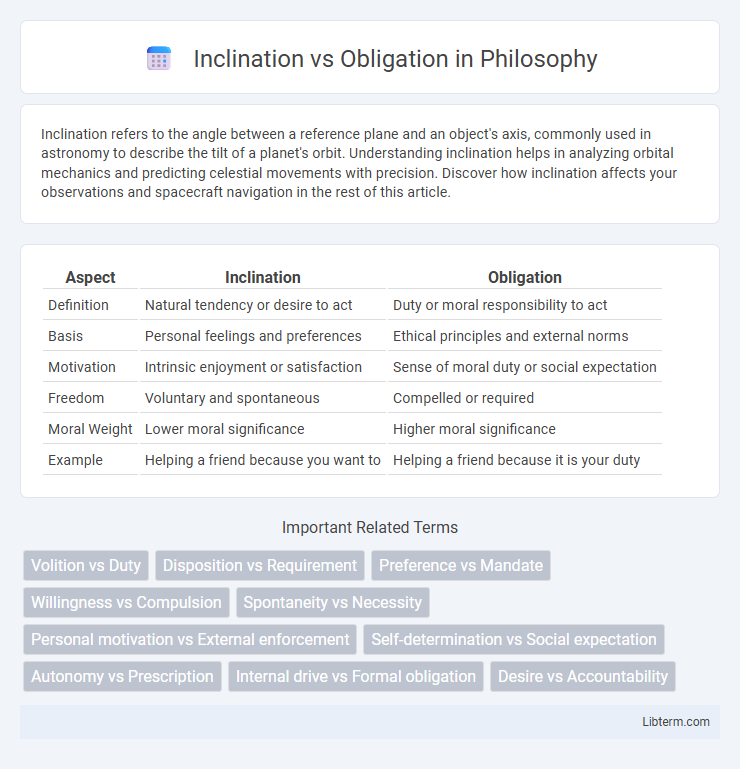Inclination refers to the angle between a reference plane and an object's axis, commonly used in astronomy to describe the tilt of a planet's orbit. Understanding inclination helps in analyzing orbital mechanics and predicting celestial movements with precision. Discover how inclination affects your observations and spacecraft navigation in the rest of this article.
Table of Comparison
| Aspect | Inclination | Obligation |
|---|---|---|
| Definition | Natural tendency or desire to act | Duty or moral responsibility to act |
| Basis | Personal feelings and preferences | Ethical principles and external norms |
| Motivation | Intrinsic enjoyment or satisfaction | Sense of moral duty or social expectation |
| Freedom | Voluntary and spontaneous | Compelled or required |
| Moral Weight | Lower moral significance | Higher moral significance |
| Example | Helping a friend because you want to | Helping a friend because it is your duty |
Introduction to Inclination and Obligation
Inclination refers to an individual's natural preference or desire to perform a particular action, driven by personal interest or emotional response. Obligation denotes a sense of duty or responsibility compelling a person to act, often influenced by external rules, social norms, or ethical considerations. Understanding the distinction between inclination and obligation is crucial in decision-making processes and moral philosophy studies.
Defining Inclination: Meaning and Examples
Inclination refers to a natural tendency or preference to think, feel, or act in a certain way, driven by personal desire or interest rather than external pressure. For example, a student's inclination toward science might lead them to pursue courses and hobbies related to physics or chemistry without any obligation. Unlike obligation, which requires action due to duty or responsibility, inclination is motivated by intrinsic interest and voluntary choice.
Understanding Obligation: Core Concepts
Obligation refers to a binding commitment or duty that compels individuals to act in specific ways, often enforced by legal, moral, or social norms. It differs from inclination, which is driven by personal desires or preferences rather than external requirements. Understanding obligation involves recognizing its role in shaping behavior through responsibilities, duties, and expectations that can override personal inclinations.
Key Differences Between Inclination and Obligation
Inclination refers to a person's natural tendency or preference toward a particular action or behavior, driven by personal desires or emotions. Obligation involves a moral or legal duty that compels an individual to act in a specific way, regardless of personal feelings. The key difference lies in motivation: inclination is voluntary and internally driven, whereas obligation is externally imposed and often mandatory.
Psychological Foundations of Inclination
Inclination is rooted in intrinsic motivation and personal desires, reflecting psychological constructs such as autonomy, competence, and relatedness outlined in self-determination theory. It arises from internal drives, emotional engagement, and individual preferences that guide behavior without external pressure. Neuroscientific studies link inclination to neural pathways associated with reward and pleasure, emphasizing its foundation in positive reinforcement and emotional satisfaction.
Social and Cultural Roots of Obligation
Obligation often stems from deep-rooted social norms and cultural traditions that dictate expected behaviors within a community. These obligations are reinforced through societal approval and cultural sanctions, shaping individuals' sense of duty beyond personal inclination. Social rituals, family roles, and cultural values play critical roles in defining and perpetuating these obligations.
The Role of Inclination in Decision-Making
Inclination plays a crucial role in decision-making by reflecting personal preferences and intrinsic motivations that guide choices beyond external pressures or duties. This internal drive often leads to greater satisfaction and commitment, as decisions align with individual values and desires. Understanding the interplay between inclination and obligation enhances the ability to predict behavior and improve motivational strategies.
How Obligation Influences Human Behavior
Obligation drives human behavior by creating a sense of duty and responsibility that compels individuals to act according to social, moral, or legal expectations. This influence often overrides personal desires or inclinations, leading to actions motivated by external pressures rather than internal preferences. The psychological impact of obligation can result in compliance, perseverance, and adherence to societal norms, shaping decision-making and goal pursuit.
Balancing Personal Inclinations with Social Obligations
Balancing personal inclinations with social obligations requires understanding individual desires alongside societal expectations, fostering harmony between self-expression and communal responsibilities. Effective management of this balance enhances mental well-being and social cohesion by aligning personal interests with duties towards family, work, and community. Prioritizing self-awareness and empathy helps navigate conflicts, ensuring that neither personal freedom nor social commitments are neglected.
Conclusion: Navigating Inclination Versus Obligation
Navigating inclination versus obligation requires balancing personal desires with external responsibilities to achieve sustainable motivation and well-being. Recognizing when to prioritize intrinsic interests over imposed duties enhances decision-making and reduces stress. Effective management of these dynamics fosters personal growth and long-term satisfaction.
Inclination Infographic

 libterm.com
libterm.com